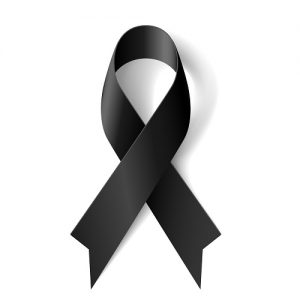The death of a celebrity, or a national tragedy can bring society closer together. It can unite society in tears and also help others question their own reality. The levels of grief and despair vary greatly. Hence reactions vary in extremity.
Collective and social grief emerges when a a universal tragedy occurs. The epicenter of the grief reaction obviously is correlated with the connection to the person or event. Hence, when a national catastrophe occurs, those with more personal investment in the people or area will react more sincerely in a true grief reaction, while others who may be empathetic but not directly related, will experience a more indirect grief reaction.

Society as a whole will react to a loss. For example, the most recent loss of Basketball Great, Kobe Bryant is a stinging loss to many and a reality check for many others. Whenever anyone dies unexpectedly, individuals react to some extent. Some may lose little sleep due to the distance of connection, but the idea of death and its reality always stings. When the person is famous and not just a mere name, it resonates with the subconscious. Whether there is emotional investment or not, the death of someone famous reinforces the idea that death happens unexpectedly and can happen to anyone, even oneself.
This is the first and most remote reaction to the loss of a famous individual. The reminding that anyone can die at any moment. This may force one to re-evaluate their own life, relations with others, or future goals. A famous person is just not anyone in the news but a person, for better or worst, that plays a key social role.
The social role that one plays to the individual will reflect the grief reaction. Fame is a way of knowing, but it is not true knowing. Yet, even though it is not the knowing of friendship, it still creates an aspect of knowing, where that famous individual has touched the person in some way. While it is not a reciprocal process such as friendship, the reality of the famous person’s influence on others is a reality. It is an imbalance but still creates a subjective connection on the part of the fan or everyday person who witnesses this person on television. While in some cases, there can be a pathological obsession and grief over-reaction to a person one does not personally know, there is definitely a reality that denotes value of that person.

And this is not obsession. Famous individuals, whether in sports, entertainment, or politics have social value. That value is what joy or status they give to one as a collective whole. A king or queen’s death represents a national death and can affect millions. Losing a sports figure, can be a great loss to a fan base that revered the player as a hero. These are not pathological reactions but true losses at different varying subjective levels.
For some though, the loss may be meaningless. If a singer dies suddenly that had no impact upon an individual, then only the reality that someone famous died resonates, but for a person who considered the singer and his or her songs to be instrumental to his or life passes, then the impact is far greater and even more personal. It is ultimately very subjective how much someone who is famous plays a part in one’s life. While it may seem silly to some, or obsessive to mourn someone you may have never met or only seen from the distance, it still does not equate to pathology but a true human connection. Again, where subjectively draws the line to a pathological grief reaction and a normal reaction is a cloudy line.

For instance, Kobe Bryant’s death has reminded everyone collectively of the fragile nature of life. His death has also brought the basketball community to tears. However, as one approaches the epicenter of the loss, proportionate grief reactions are seen more intense. The friendship Kobe had with teammates and family is obviously greater than that of a distant fan. The love between his parents, wife and children is also far more intense. Kobe is not an image to these individuals but a true reciprocal relationship. Kobe’s closest family did not lose a mere name or symbol, but a husband, father and son.
If grief reactions from fans or the national collective match the intensity of close family and friends, then one may have to consider the attachment to Kobe and the grief reaction to be obsessive and pathological. Yet, to merely admonish someone for grieving the loss of a famous individual is wrong and simply bad grief counseling. It is healthy to socially grieve a sports hero but it has to be proportionate. Grief Counselors need to identify what is healthy and not healthy in this type of social grief.
With social media discussing his death everywhere there are bound to be ignorant comments and reactions. Some will come from individuals who fear death itself and prefer to ignore it or hide it by dismissing Kobe. There will be those who downplay it and criticize others for grieving the loss. Others will dismiss Kobe and say, others should only grieve real heroes, like soldiers. These dismissive snubs and rude remarks are a result of inner issues or reactions to arise responses from others regarding Kobe’s death. They will seek to escape the story of his death and troll other social media users.
In the social media age though, this is what occurs when news happens. There is naturally an over flooding of content of which is sure to upset some. Some individuals will post and post about an event. Others within the news or light of society, will try to make memes about the death of an individual. Many are attempting to memorialize the event. Others may be over reaching and creating more drama than necessary. Hence, one will see in deaths, a rift between the over dramatic and the acrimonious. Where one will over dramatize the event, while the other downplays the death with sarcastic remarks.

Why is Kobe’s death more impactful? Why are the unknown people that die not recognized at such a dramatic and universal level? Why is the death of a soldier not mourned more universally than the death of a star? One is never dismissing the death of anyone, especially soldiers or others who may have died, with Kobe, in the tragic helicopter accident, but when famous people die, people notice. Maybe not due to importance of the person personally, or that this person did more or did less, but because famous people are known. A known individual, important or not, touches everyone. How it touches one may vary, but it nonetheless touches. A soldier’s death clearly is more impactful than a mere stranger. While the soldier is not personally known, he collectively represents our national heroes, but the impact of a famous person’s death may resonate deeper because that person is known. Whether this occurs for everyone or not depends on their military up-bringing, level of patriotism, and values. Obviously, a soldier’s death is far more important to the nation, but in regards to attachment, fame can make one feel closer.

This is probably why the death of a famous military leader, war hero, or king garnishes the most acknowledgement in society. It captures true objective importance and also the subjective relationships formed by the masses regarding the individual.
How the person touched you, even though it was never a friendship, depends on the value the person played in your life and what that person contributed socially to the nation and society, or to your own personal views and development. Hence, grief, even over someone you never met, is justified. The reaction though to not be pathological must be proportionate.
For one person, a particular singer may have created a song so important to the person’s life that it encouraged him or her on the darkest days. For another person, the magical shot Kobe hit that lifted the Lakers to another title, may have been a cherished moment with a father and son. These moments are not replaceable and play a key role in the person’s life narrative and when the person who shared in it, passes away, it creates a reaction. Famous individuals whether in a reciprocal relationship or not can sometimes unknowingly play an important part in someone’s life.

Please also review our Grief Counseling Certification program and see if it matches your academic and professional goals.
Whether pathological reactions, bitter reactions, or true sad social reactions proportionate to the death exist, there will always be reactions to the death of a famous person in any social sphere because it forces one to wrestle with the notion of death.
If you would like to learn more about Grief Counseling or would like to become certified in Grief Counseling then please review the American Academy of Grief Counseling’s certification program and see if it matches your academic and professional goals. The Grief Counseling Certification is a four year certification and open to behavioral health and healthcare professionals. The program is also open to those in ministry and care of the grieving.
